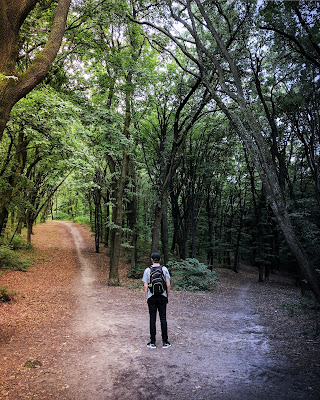 |
| Photo by Skyler Gerald on Unsplash |
Wednesday, May 21, 2025
Leadership should be born out of the understanding of the needs of those who would be affected by it (Marian Anderson)
Tuesday, November 5, 2024
It's hard to make sentences too short (Seth Godin)
 |
| Photo by Wesley Tingey on Unsplash |
As usual, I'm reading two books at once. One is a non-fiction book by Ryan Holiday, the other is a novel by Penelope Fitzgerald. I love them both but for different reasons.
Generally, Ryan uses shorter sentences than Penelope. She's a brilliant writer who packs a lot of brilliance into her sentences - so much so that I savor the words a lot more, whereas I savor the message more from Ryan.
Here's what I mean:
Ryan - Outward appearances are deceptive. What's within them, beneath them, is what matters.
Penelope - She had a kind heart, though that is not of much use when it comes to the matter of self-preservation.
See what I mean? Both are examples of great short (ish) sentences, but different.
Seth Godin says:
The most direct way to improve your writing is to make your sentences shorter.
I was reading a magazine article yesterday and was rapidly losing interest. The topic appealed to me, but I couldn’t keep reading. Then I noticed that halfway through the first column, I was still on the same sentence.
We have trouble keeping that long a string in our heads at once.
You can make sentences too long.
But it’s hard to make them too short.
Saturday, July 13, 2024
Put me in coach
Big football at colleges in the US costs more than $5 billion a year. And none of these programs has a student acting as a coach.
The same analysis, at a much smaller scale, applies to school theater directors and producers, conductors of the jazz band or orchestra and even the coach of the chess team.
We learn by doing, not by winning.
What happens if we embrace this and make education about learning? What would happen if the head of the football program simply taught students how to be coaches? Or the head of the music program challenged kids to conduct?
My most important learning experiences in organized schooling came from the random moments when I actually got to organize instead of being organized.
When I was a student at Mt. Albert Grammar, student coaches were often matched to junior teams. Maybe there weren't enough staff to take them, I'm not sure, but I loved having someone from the first XI coaching us.
Of course, the quality varied but I had a couple of great student mentors in those teams before I joined the first XI myself for three memorable years in the mid-seventies.
Monday, April 8, 2024
Panic on the streets of London, panic on the streets of Birmingham. I wonder to myself - could life ever be sane again? (The Smiths)
Seth Godin makes a great point about surprise and uncertainty:
Until just recently, a solar eclipse wasn’t a tourist event. It was the cause of real panic.
Two reasons that are worth considering:It was a surprise. They were not predicted.
They were unexplained. No one had any idea what was going on.
Eliminate surprise and explain the circumstances and panic starts to fade.
Sunday, March 24, 2024
Over the mountain watching the watcher, breaking the darkness (Pink Floyd)
 |
| Photo by Oscar Keys on Unsplash |
It’s honest when we acknowledge that just about everything is out of our control. We can work to influence it, we can practice accepting it, but any time we’re engaging with others or with the future, we’re not completely in charge.
Control is elusive. If we accept the parts that are out of our hands, we can focus on the elements where we have leverage and influence instead.
Sunday, January 21, 2024
Do as I say
 |
| Photo by NEOM on Unsplash |
“Do as I say.” That’s industrial management in four words.
If you don’t follow the instructions to the letter, you’re insubordinate. Not subordinate.
Complete subordination might have been the goal in an industrial setting. But now, it’s dangerous, expensive and inefficent. Because people close to the work know exactly what needs to be done.
The opposite of insubordination is now enrollment.
Someone who is enrolled in the journey doesn’t have to be told exactly what to do. Instead, given the goals, the tools and the culture, they will figure it out.
Seth Godin
Tuesday, January 16, 2024
The plants grow themselves
 |
| Photo by Markus Spiske on Unsplash |
Kash’s garden
She doesn’t grow plants.
The plants grow themselves.
Her job is to create conditions for the plants to grow.
The soil, the water, the light, the weeds… these are the conditions.
But none of it happens if the plants don’t do the thing they want to do in the first place.
This is always true, anywhere a leader succeeds.
Creating the conditions is the hard part.
Seth Godin
Tuesday, January 2, 2024
Which agenda? (Seth Godin)
 |
| Photo by Marissa Grootes on Unsplash |
It seems like a waste to spend one as a to-do list item on someone else’s agenda.
It’s easy to become so focused on checking the boxes that we forget that there are people involved. Peers, colleagues and friends that with something human to offer, if we only cared enough to connect.
Seth Godin
Thursday, November 30, 2023
I'll get by somehow (John Lee Hooker)
 |
| Photo by Lina Trochez on Unsplash |
Somewhere, there is the ideal soil for growing mangoes. Or the best possible wave for surfing. Or the most romantic sunset for a proposal.
But it’s not right here and it’s not right now.
Our success has a lot to do with how we dance with conditions that aren’t quite perfect.
Seth Godin
Saturday, September 23, 2023
Empathy
 |
| Photo by John Bogna on Unsplash |
We have a two week study break now until John Lennon's birthday rolls around. So until then you'll be getting some stop gap favourite quotes.
Here's today's quote that I'm pondering:
When things don’t work, it’s not helpful to try to minimize the impact. In fact, you’re far more likely to make progress if you remind the customer just how much it mattered to you to get it right, and how you feel about letting them down.
Empathy is a first step toward connection.Seth Godin
Sunday, February 12, 2023
It says right here on page 43 that you should grab a hold of it else you'll find It's passed you by (David Crosby)
During a question and answer session with my new Year 3 students I was asked some really great questions.
One was around - what do you do to help the teachers?
My immediate response was that I meet with the team daily, first thing in the morning for ten minutes, and I aim every day to start the day in a positive way. That was followed by a rather lame, 'and I empty the dishwasher each morning'.
I could have used Seth Godin's list, “What do you do around here?”
I challenge the status quo
I show up on time
I absorb nonsense and create calm for others
I raise our standards
I help people feel seen
I’m steady
I don’t cause trouble
I bring energy
I lead the way
I turn mountains into molehills
I must remember that last one for next time.
Tuesday, February 7, 2023
The decisions about time and resources–about what to do next–change everything (Seth Godin)
 |
| Photo by Vadim Bogulov on Unsplash |
Wednesday, February 1, 2023
Ubiquity (for a while)
 |
| Photo by Andrea De Santis on Unsplash |
The coming ubiquity
The fuss about AI might be mis-focused.
It’s easy to point to a computer-created essay, song or illustration and find the defects or errors. Given hard work by 1,000 trained people, it’s likely that a human could make something more useful or inspired than a computer could.
But the real impact of AI isn’t going to be that it regularly and consistently does far better than the best human effort.
The impact will be that it is widespread, cheap and always there.
Search for anything and the Wikipedia page will ‘write itself’ just for you.
Brainstorm 12 variations of a solution to any problem you’re thinking about. Have a Rogerian therapist and idea coach on call at all times.
Press a button on your fridge and see a dozen recipes that use what’s in the produce drawer, and just that.
Everywhere, all the time.
Ubiquity is the quiet change we rarely see coming.
Sunday, June 26, 2022
Achieve more, every day.
One of last week's highlights was a visit to the Hastings' factory of Hustler (if you are looking for farm equipment, look no further) with my Year 13 students.
Three words that open the door for insight, understanding and improvement.
Gratitude isn’t in question. Neither is acceptance of the situation. It’s not unpatriotic or disloyal to talk about how something could be improved. Instead, when we care enough to say, “could be better,” we’re putting ourselves on the hook to create. You need to care enough to describe an improvement.
Because once you’ve announced how something can be better, you get the chance to show that it can be done.
Saturday, January 15, 2022
I saw myself in checkered lands, I even dreamt I was the knight in command (Split Enz)
 |
| Photo by Jan Tinneberg on Unsplash |
The starting off point for this post is a question from Seth Godin - What did you expect?
If you open a roadside motel, expect that tired and demanding budget travelers will arrive.
If you run a fancy restaurant, don’t be surprised if people will angle and cajole and lie to get a ‘better’ table.
If you’re a mental health professional, expect that the people you encounter will have issues with their mental health.
Wednesday, January 5, 2022
If something is perfect from start to finish there is no suggestion of the infinite (Yanagi Soetsu)
 |
| Photo by Photoholgic on Unsplash |
The two choices for anyone with a new idea
“It’s simple.”
“It’s complicated.”
When you talk to someone about your new idea, they’re going to realize right away that it’s one or the other.
The trap is trying to pitch a complicated cultural shift, possibility or project as if it’s simple.
Darwin’s insight about how the world evolved is simple once you understand it, but it represents such a conceptual leap that bringing it to someone who’s looking for a simple and easy explanation is sure to fail. But if you invite someone along for a journey instead of a quick fix, you earn the right to take your time and tell your story.
The simple/complex trap often confuses well-meaning people in politics, business and the arts. The solution isn’t to dumb down the complex. The solution is to invite the right people along on the journey.
Monday, December 6, 2021
Use your best judgment (Seth Godin)
Photo by Vladislav Babienko on Unsplash
I have been wrestling with a systems problem at my Hastings' campus around where best to locate various senior year groups in 2022 - juggling spaces, numbers of students, and the need for supervision.
I've canvassed opinions, listened to alternative ideas, checked alternatives with my trustees and the big boss and mulled it all over for a few days.
I am now going to do a pros and cons chart for the two main ideas and then present this to my team to make a decision (best idea wins) because, as Seth says:
'Use Your Best Judgment. Don’t wait for someone else to take responsibility. Don’t wait for perfect. Don’t wait to find this exact situation in the manual or in history. Use Your Best Judgment.'In this case, rather than me making a decision, I need a broad consensus of agreement. There are many moving parts and many important staff members who need to have buy in to make it work.
Wednesday, September 15, 2021
Creativity is the magical human act of doing something that might not work (Seth Godin)
 |
| Photo by Alice Dietrich on Unsplash |
In these turbulent times of working from home during lockdown, Seth Godin's words take on a fresh resonance for me.
He says that Creativity and Leadership are related (yes, upper case):
Management isn’t. Management uses power and authority to get people to do tasks you know can be done. Management is needed, but management is insufficient.
Leadership is voluntary. It’s voluntary to lead and it’s voluntary to follow. If you’re insisting, then you’re managing…
And creativity is the magical human act of doing something that might not work. If you know it’s going to work–then it’s management.
Saturday, July 24, 2021
Yes, yes, you had to be a big shot, didn't you (Billy Joel)

Photo by Kajetan Sumila on Unsplash
Seth Godin is a prolific writer. Not only does he blog every day, for the most part he has really smart things to say.
His post, titled 'the focus on the last thing' resonated with me a lot (my emphasis below btw):
The play before time ran out. The last speech of the campaign. The typo on your resume or the spot on your tie. The final decision before the company declared bankruptcy.
We focus on the thing that happened just before the end. And that’s almost always an unimportant moment.
Things went wrong (or things went right) because of a long series of decisions and implementations. A misguided strategy, a bad hire, a brilliant insight about network effects–these are the acts with leverage, not the obvious thing that all the pundits would like to talk about.
When you get to the thing before the last thing, don’t sweat it. It’s almost certainly too late to make the outcome change. On the other hand, when you’re quietly discussing the thing before that before that before that before that, it might pay to bring more attention to it than the circumstances seem to demand. Because that’s the key moment.
Monday, July 19, 2021
We might still survive and rise up through the maze, if you could change your life and never be the same (Crowded House)
 |
| Photo by Jamie Street on Unsplash |
While still on holiday, I thought I'd include this Seth Godin's post as it resolves a few issues for me:
A coaching paradox
At the top tier of just about any sort of endeavor, you’ll find that the performers have coaches.
Pianists, orators and athletes all have coaches. In fact, it would be weird if we heard of someone on stage or on the field who didn’t have one.
And yet, in the world of business, they’re seen as the exception.
Part of the reason is that work feels like an extension of something we’ve been doing our whole lives. Figure skating isn’t like school, but showing up at work seems to be. “I’ve got this,” is a badge of honor.
And part of the reason is that a few coaches have made claims that stretch belief, and we’re not actually sure what they do. It doesn’t help that there’s no easy way to identify what sort of coach we need or what we’re going to get…
It turns out that the people with the potential to benefit the most from a coach are often the most hesitant precisely because of what coaching involves.
Talking about our challenges. Setting goals. Acknowledging that we can get better. Eagerly seeking responsibility…
And yet we avert our eyes and hesitate. It might be because having a coach might be interpreted as a sign of weakness. And what if we acknowledge our challenges but fail to overcome them? It could be that we don’t want to cause change to happen, or that we’re worried that we will.
One company I admire believes in coaches so much that they’ve put several on staff, ensuring that their leadership all benefit from one. But mostly, it’s something we have to pay for ourselves.
And so, paying for a coach, for something that’s hard to measure, which might be socially awkward, to get better at something that feels normal—combine that with a hesitancy to ask for help—it’s a wonder anyone has a coach.
The paradox is that the very things that hold us back are the reasons we need a coach in the first place.




